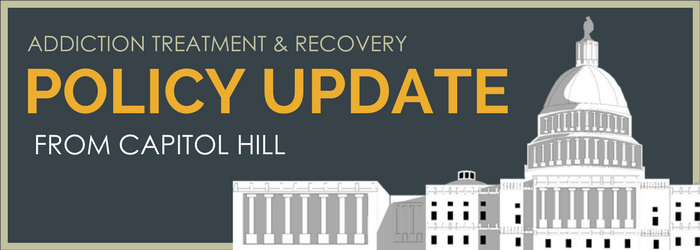
May 10, 2017 |
May 2017 Addiction Policy Update

Affordable Care Act Repeal & Replacement
On May 4th, the House passed an amended version of the American Health Care Act (AHCA) by a vote of 217 – 213 with 20 Republicans joining all Democrats in voting “no.” Click here to see how Members voted.
The bill now moves to the Senate, where the process may be lengthy and several Senators have said the Senate will craft its own legislation. The Senate bill will be developed by a working group of members from the Senate Finance, Budget and Health, Education, Labor and Pensions (HELP) Committees. Senate HELP Committee Chair Alexander (R-TN) confirmed that the Senate will develop its own package and reporters,
“We’ll take whatever good ideas we find there [the House bill] that meet our goals.”
The package developed by the Senate workgroup will likely differ from the American Healthcare Act (AHCA) for both procedural and policy reasons. Many of the provisions in the bill as passed by the House likely cannot move in the Senate on the special reconciliation procedure, which only requires 51 votes for passage. Additionally, many moderate Senators, especially those from Medicaid expansion states, have expressed concerns with the changes to the Medicaid program in the AHCA. In a statement, Senator Portman (R-OH) said,
“I’ve already made clear that I don’t support the House bill as currently constructed because I continue to have concerns that this bill does not do enough to protect Ohio’s Medicaid expansion population, especially those who are receiving treatment for heroin and prescription drug abuse. We have an opioid crisis in this country, and I’m going to continue to work with my colleagues on solutions that ensure that those who are impacted by this epidemic can continue to receive treatment.”
In terms of timing, Leader McConnell (R-KY) said the Senate will not consider a bill without a Congressional Budget Office (CBO) score, which will provide cost and coverage numbers. Once a score is released, the Senate parliamentarian will review it to see what provisions comply with the reconciliation rules. CBO’s work and the parliamentarian’s review process could take several weeks, possibly pushing Senate debate until at least June. The score and parliamentarian’s analysis will likely guide the Senate workgroup’s work; Sen. Collins (R-ME) said,
“We certainly need the CBO analysis on the impact on cost and coverage before we can produce our own [bill].”
Reiterating that Senators do not feel pressured to act quickly, Senate Majority Whip Cornyn (R-TX) made clear that the Senate is not under a deadline and said,
“When we have 51 Senators we will vote, but not until then.”
It is unclear if the House would be able to pass a modified bill when/if it is returned to the chamber for consideration.
Budget & Appropriations
On May 5th, the President signed into law the Fiscal Year 2017 omnibus appropriations bill. The agreement provides $77.7 billion in discretionary funding for the Department of Health and Human Services, a $2.7 billion increase above the fiscal year (FY16) level. A summary of the bill prepared by the House Appropriations Committee is available here.
Some key provisions in the Labor-HHS section include:
FIGHTING THE OPIOID EPIDEMIC: combined with the $500 million from 21st Century Cures which was already appropriated, the bill includes an increase of $650 million in FY17 for opioids. Specifically:
- $112 million for the CDC, $42 million over FY16, for preventing prescription drug overdoses
- A $150 million increase for efforts to combat opioid and heroin addiction on top of the $500 million authorized by the 21st Century Cures Act
- A $31 million boost in medication-assisted treatment programs, for a total funding level of $56 million
- $20 million for programs authorized in a 2014 opioid response law, including $1 million for increased access to overdose treatment, $12 million to train first responders, and $3 million for recovery community-building
- A minimum of $50 million to be awarded to Community Health Centers for treatment, prevention, and awareness of opioid abuse
- $3 million for the Agency for Healthcare Research and Quality related to effective primary care support as well as medical care delivery in rural communities
MENTAL HEALTH: $1.2 billion for mental health programs within SAMHSA and HRSA. This level includes an $80 million increase above FY16 for key mental health investments. The bill provides $541.5 million, an increase of $30 million above FY16, for the Mental Health Block Grant, and continues a 10 percent set-aside for serious mental illness activities. The bill also provides $50 million within the funding for Community Health Centers to provide mental health services at health centers across the country.
This Policy Update was generously provided by Holly Strain & Carol McDaid of Capitol Decisions.

